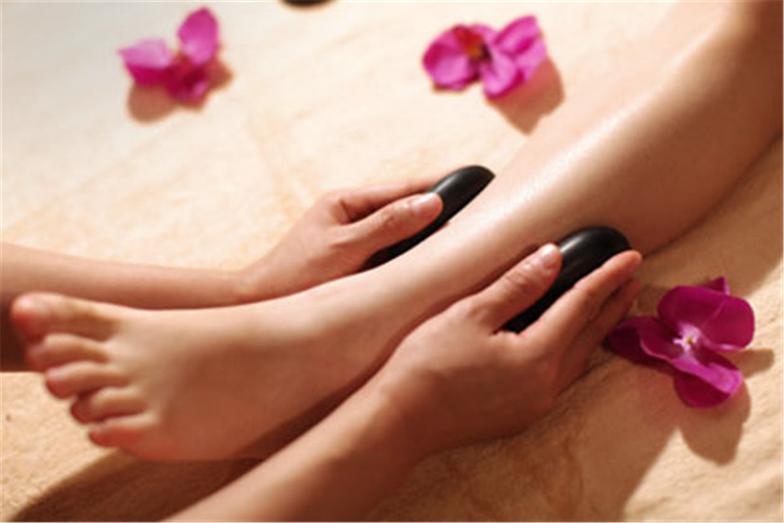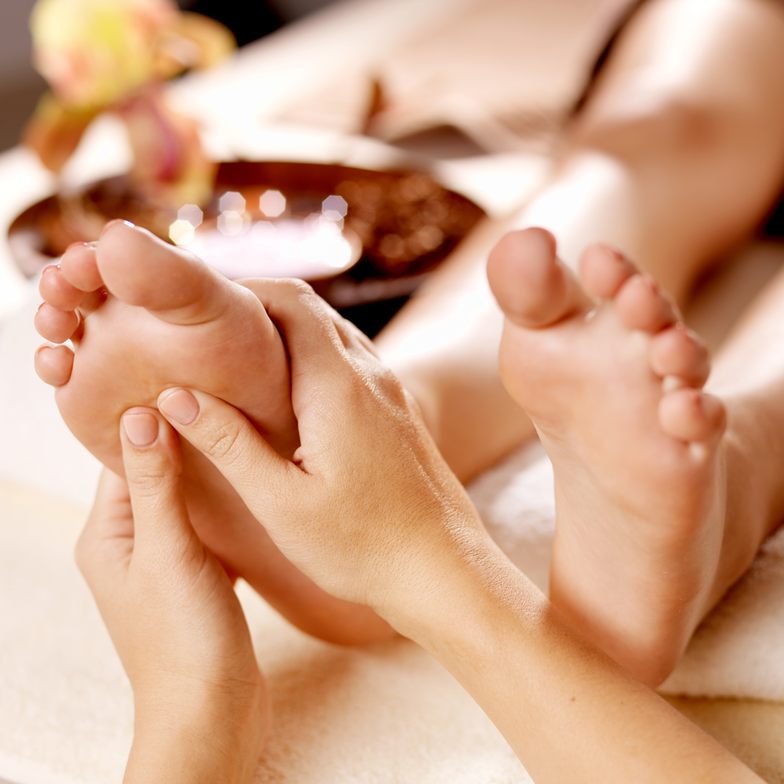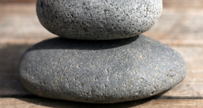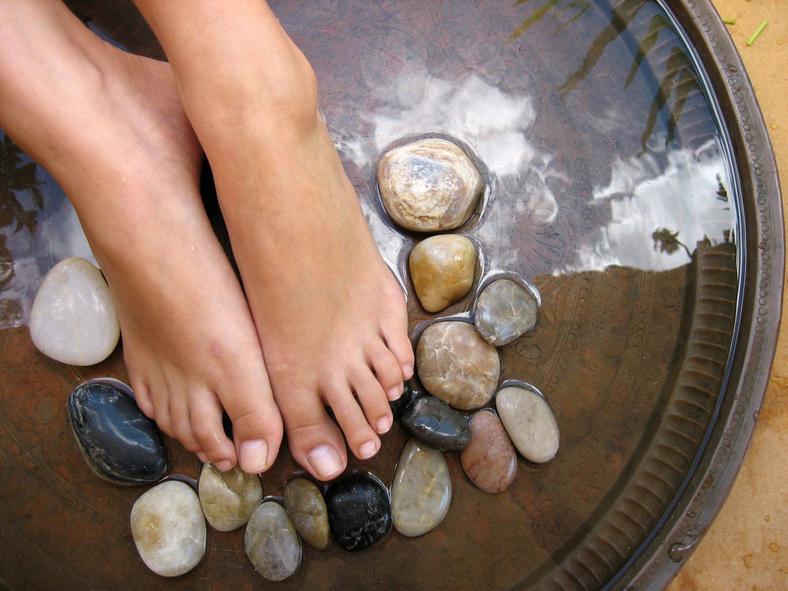20432 Beaver Creek Road
Hagerstown, Maryland 21740
301-302-7777
Reflexology is an ancient healing art based on the principles that there are reflexoloy in the hands, feet and ears that correspond to every part, organ and gland in the body. By using acupressure and massage on the hands, feet and sometimes ears, the client benefits from improved circulation, detoxification, reduced tension and the body's ability to heal itself.
Reflexology
- A deeply relaxing and therapeutic response
- Increased digestive response and constipation relief
- Sinus drainage, while still in the session
- Decreased bronchi and lung congestion
- Reduced swelling in the feet and lower limbs.
- Increased lymphatic, nerve and blood circulation.
- Uterine reflex stimulation for overdue babies or late menses
- Uterine reflex stimulation will also relieve some of the symptoms of PMS (premenstrual syndrome).
- Reduced muscular tension in the neck, shoulders, elbows, hips, sciatic area, and spine.
- Kidney stones have been reported to pass with the stimulation of the kidney reflexes.
- Many clients report they are as relaxed as if they had a full body massage.
Disclaimer: Integrative Reflexology is not intended to diagnose or treat conditions that require medical attention. As with any medical concerns, by a client about the state of their health they should consult
60 mins individual session
70-mins Hand & Feet individual session
60-mins couples session
70-mins Hands & Feet couples session
90 mins Couples Reflexology LESSON
110
145
240
310
270
BABIES: can receive a reflexology treatment that focuses on points for colic,
sinus congestion, constipation, and relaxation.
CHILDREN: will also benefit from stimulation on their feet. It will increase their
immune function. They will benefit with ease of digestion. And
even ADD (attention deficit disorder) has been reduced.
ADULTS: benefit when they have a stressful lifestyle (stress is the number one reason to receive this). Reflexology increases deep relaxation and deep breathing.
PREGNANT WOMEN: often hear that they cannot receive a foot massage or reflexology because it could put them into early labor. A trained therapist knows where they may work and the points to avoid. The points for hips, spine, sinuses, digestion all bring welcome relief for common pregnancy induced discomforts.
CHRONICALLY ILL: will receive both pain relief from a session, as well s digestive support.
ELDERS: love reflexology, because they are often not touched enough, and they do not have to get undressed. The reflexology session will increase their circulation and give a sense of deep relaxation.
CANCER PATIENTS: will benefit due to the increase in their immune function by the reflexology session. It may offset the nausea that may accompany their treatments. The endorphin response will help alleviate pain.
AUTOIMMUNE DISORDER: clients who suffer with this will benefit by the increased immune function and pain relief.
TERMINALLY ILL: will respond to reflexology in profound ways. It will ease their anxiety, and assist in breathing. It supports the functioning of the organs, and of the digestive system and the kidneys.
Each Certified Reflexologist will create their on unique approach in giving therapeutic reflexology session.
Your session may include:
- a therapeutic foot soak. The 5 minute foot soak may have essential oils, herbs, rocks, even lemons
- a foot scrub with either salt, or sugar and aromatic oils
- the use of a hydrating foot cream
- whole hand strokes, to release tension and increase circulation
- specific point stimulation of reflex points and areas
- foot and toe stretches
- sessions generally are performed on a massage table, or in a relaxation chair
- your Certified Integrative Reflexologist may incorporate massage as needed in your session
- hand reflexology to further enhance the relaxation and therapeutic response
- generally the entire session, with the foot soak, foot and hand reflexology will take 60-minutes.
Although reflexology is very beneficial to many people, there are certain conditions in which reflexology is not advisable. Just like massage, infectious conditions, fever, or acute inflammations of the venous and lymphatic systems make reflexology treatment risky. Thrombosis, blood clots, are extremely dangerous in bodywork, since a dislodged clot could cause a stroke, heart attack or even death. Clients with advanced diabetes and osteoporosis should also not seek reflexology because foot manipulations and deep pressures may cause damage. Severe circulatory conditions, infections or sores on the feet, and atrophy (nonuse) also make reflexology inadvisable. Although pregnancy symptoms can be helped by reflexology, a client with an unstable pregnancy would find reflexology too stimulating and might begin labor or a miscarriage.
No, reflexology should not be a painful experience, but rather a very
relaxing and soothing one. However, everyone's pressure threshold
may vary. Should you experience any discomfort, please let your
therapist know so that they may lessen their pressure.
Usually reflexology sessions are scheduled once a week. In acute situations, reflexology may be performed every third day. Certain points can be worked daily.
Reflexology effects are usually felt 24-48 hours after treatment. There are a variety of common reactions, because the body is getting rid of toxins:
- increased urination (darker and stronger smelling than normal)
- flatulence and more frequent bowel movements
- outbreak of sweat in the palms of the hands, feet and other areas of the body
- increased secretion of the mucous membranes
- increased vaginal secretions
- disrupted sleep patterns, tiredness, and feeling refreshed, relaxed and energetic.
Less common reactions include:
- headache
- dizziness
- emotional release, especially a tendency to weep, temporary outbreak of suppressed diseases
- aggravated skin conditions
- chilliness and shivering
Increasing your water intake is always recommended with all bodywork. With reflexology, you should drink even more water because the increased water will hasten the toxins from exiting your body, and you will feel better more quickly.
Benefits
Frequently Asked Questions
Who should receive an integrative reflexology session?
What should I expect during my reflexology session?
When should reflexology not be used?
Is reflexology painful?
How often should I have a reflexology session?
What are common reactions to a reflexology treatment?
What are less common reactions to a reflexology treatment?
What should I do to enhance a reflexology treatment?









